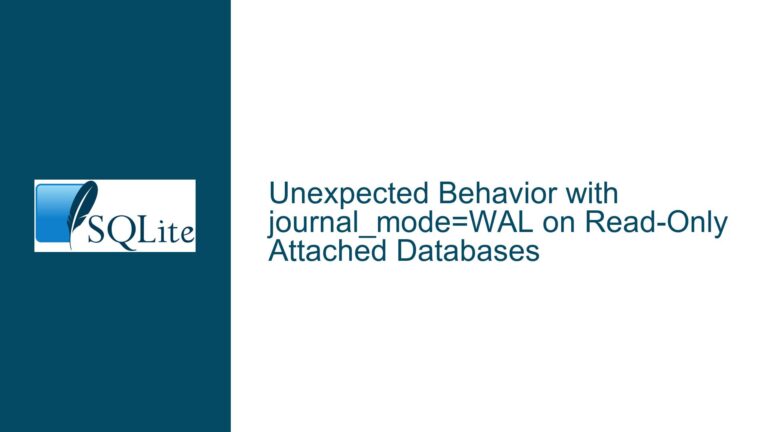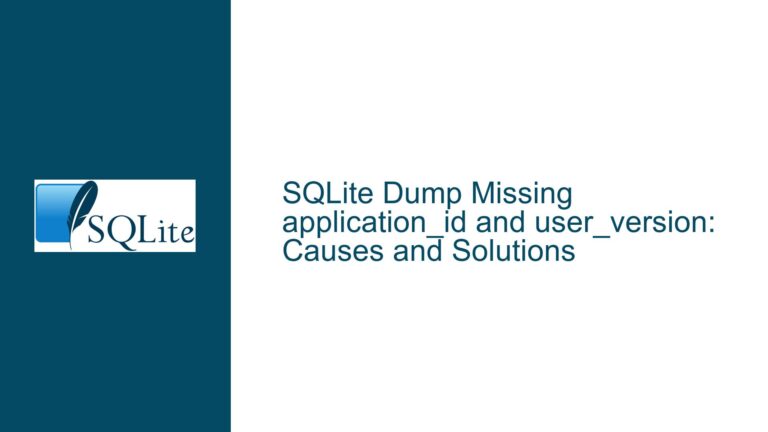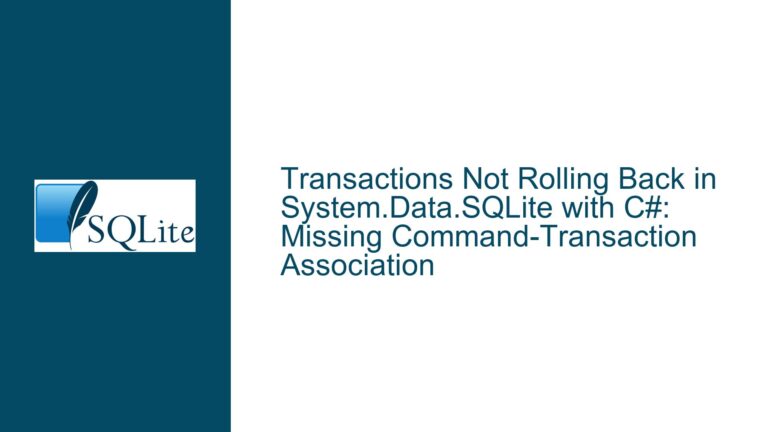Crash in SQLite FTS3 Extension Due to NULL Pointer Dereference with SQLITE_ENABLE_FTS3_PARENTHESIS
Understanding the FTS3 Extension Crash: NULL Pointer Dereference and Security Implications
The SQLite FTS3 (Full-Text Search Version 3) extension provides full-text indexing and search capabilities for databases. A critical crash scenario arises when SQLite is compiled with the SQLITE_ENABLE_FTS3_PARENTHESIS compile-time option, which enables enhanced handling of parentheses in FTS3 queries. Under specific conditions involving malformed or specially crafted SQL statements, the FTS3 extension may dereference a NULL pointer, leading to a segmentation fault or application crash. This vulnerability has existed in the codebase for over a decade, dating back to versions prior to SQLite 3.8.0 (circa 2013). The crash is not merely a stability issue but poses a security risk if an attacker can inject malicious SQL scripts that exploit this flaw. A separate but related issue involves the SQLite CLI (Command-Line Interface) crashing when using the .limit sql_length 40 command due to an assertion fault, though this is less severe as it requires direct access to the sqlite3_db_config() interface.
The NULL pointer dereference in FTS3 occurs during query parsing when the extension processes nested or improperly structured full-text search expressions. The SQLITE_ENABLE_FTS3_PARENTHESIS option modifies how parentheses are interpreted in FTS3 queries, introducing edge cases where internal data structures may not be properly initialized. For example, a query containing unbalanced parentheses or a specific sequence of operators could bypass sanity checks, leaving critical pointers uninitialized. When the code attempts to access these pointers, the dereference operation fails, causing a crash. The CLI assertion fault, while less dangerous, highlights broader code quality concerns in error-handling paths, particularly when resource limits are manipulated.
This issue is exacerbated in environments where SQLite is embedded within applications that dynamically generate SQL queries or accept user-supplied input for FTS3 searches. Web applications, mobile apps, or desktop tools using SQLite for local storage without rigorous input validation are at risk. The vulnerability’s longevity underscores the challenges of maintaining backward compatibility in widely used libraries while addressing latent defects. The fix, now available in SQLite trunk (development branch) and the 3.39 maintenance branch, involves adding NULL checks and restructuring the FTS3 query parser to handle edge cases gracefully.
Root Causes: Compile-Time Options, Legacy Code Paths, and Assertion Handling
The NULL pointer dereference in the FTS3 extension is directly tied to the SQLITE_ENABLE_FTS3_PARENTHESIS compile-time flag. This option extends the FTS3 query syntax to support parentheses for grouping search terms, a feature not enabled by default. When activated, the FTS3 parser employs a recursive descent algorithm to evaluate nested expressions. A flaw in this algorithm fails to handle certain malformed queries, such as those with unmatched parentheses or improperly sequenced operators (e.g., NEAR, AND, OR). For instance, a query like "a OR (b AND c" (missing closing parenthesis) could trigger a stack underflow or leave a parser context object in an inconsistent state, resulting in uninitialized pointers.
The vulnerability’s persistence for over a decade highlights the risks of infrequently tested code paths. The SQLITE_ENABLE_FTS3_PARENTHESIS option is not widely used, as most applications rely on the default FTS3 syntax. Consequently, the affected code received limited scrutiny during routine testing and code reviews. Additionally, the SQLite team’s emphasis on backward compatibility and minimal regression risk likely discouraged aggressive refactoring of legacy components. The crash manifests only when both the compile-time option is enabled and a malicious or malformed query is executed, making it a low-probability but high-impact defect.
The CLI assertion fault involving .limit sql_length 40 stems from improper use of the sqlite3_db_config() interface. The CLI’s limit command adjusts runtime limits such as SQLITE_LIMIT_SQL_LENGTH, which restricts the maximum length of SQL statements. When reducing this limit below the length of an already-prepared statement, an internal assertion fails in debug builds, causing a crash. Assertions are typically enabled only in debug configurations, so production builds may not exhibit this behavior. However, this indicates insufficient validation in the CLI’s command processing logic, where limit changes are not checked against current usage.
Resolution: Patching, Workarounds, and Secure Configuration Practices
To resolve the FTS3 NULL pointer dereference, users must upgrade to SQLite 3.39.0 or later, where the fix is included. The patch modifies the FTS3 query parser to validate pointers before dereferencing them and adds error handling for malformed parentheses. For applications that cannot immediately upgrade, disabling the SQLITE_ENABLE_FTS3_PARENTHESIS option at compile time eliminates the vulnerability. This can be achieved by omitting -DSQLITE_ENABLE_FTS3_PARENTHESIS from the compiler flags. If the option is required for functionality, rigorous input validation must be implemented to reject queries with unbalanced parentheses or unexpected operators.
For the CLI assertion fault, the solution involves avoiding the use of .limit sql_length 40 (or similar commands) after preparing long SQL statements. Developers using the CLI in debug environments should ensure that SQL statements are finalized or reset before altering limits. The SQLite team has addressed this in later versions by hardening the sqlite3_db_config() interface against invalid state changes.
Step-by-Step Mitigation Guide:
- Upgrade SQLite: Obtain the latest version from the official SQLite website or integrate the 3.39.x branch into your project.
- Recompile with Caution: If using custom builds, verify that
SQLITE_ENABLE_FTS3_PARENTHESISis disabled unless explicitly needed. Review all compile-time options usingsqlite3_compileoption_get(). - Input Sanitization: Implement strict validation for FTS3 queries, rejecting any with unbalanced parentheses or unrecognized operators. Use whitelists for allowed syntax.
- CLI Best Practices: Avoid changing limits mid-session in the CLI. If necessary, reset prepared statements before adjusting limits.
- Monitoring and Logging: Enable SQLite’s error logging via
sqlite3_config(SQLITE_CONFIG_LOG)to capture and analyze crashes in production environments.
For embedded systems or legacy applications where upgrades are impractical, consider intercepting FTS3 queries at the application layer and using regular expressions to detect and block problematic patterns. Additionally, employ memory-safe languages or sandboxing techniques to isolate SQLite operations and mitigate the impact of crashes.
Proactive measures include conducting security audits of SQLite usage in your codebase, particularly focusing on FTS3-enabled modules and CLI integration. Stress-test applications with fuzzing tools like OSS-Fuzz to uncover similar latent vulnerabilities. Finally, subscribe to SQLite’s security advisories to stay informed about future patches and threats.






